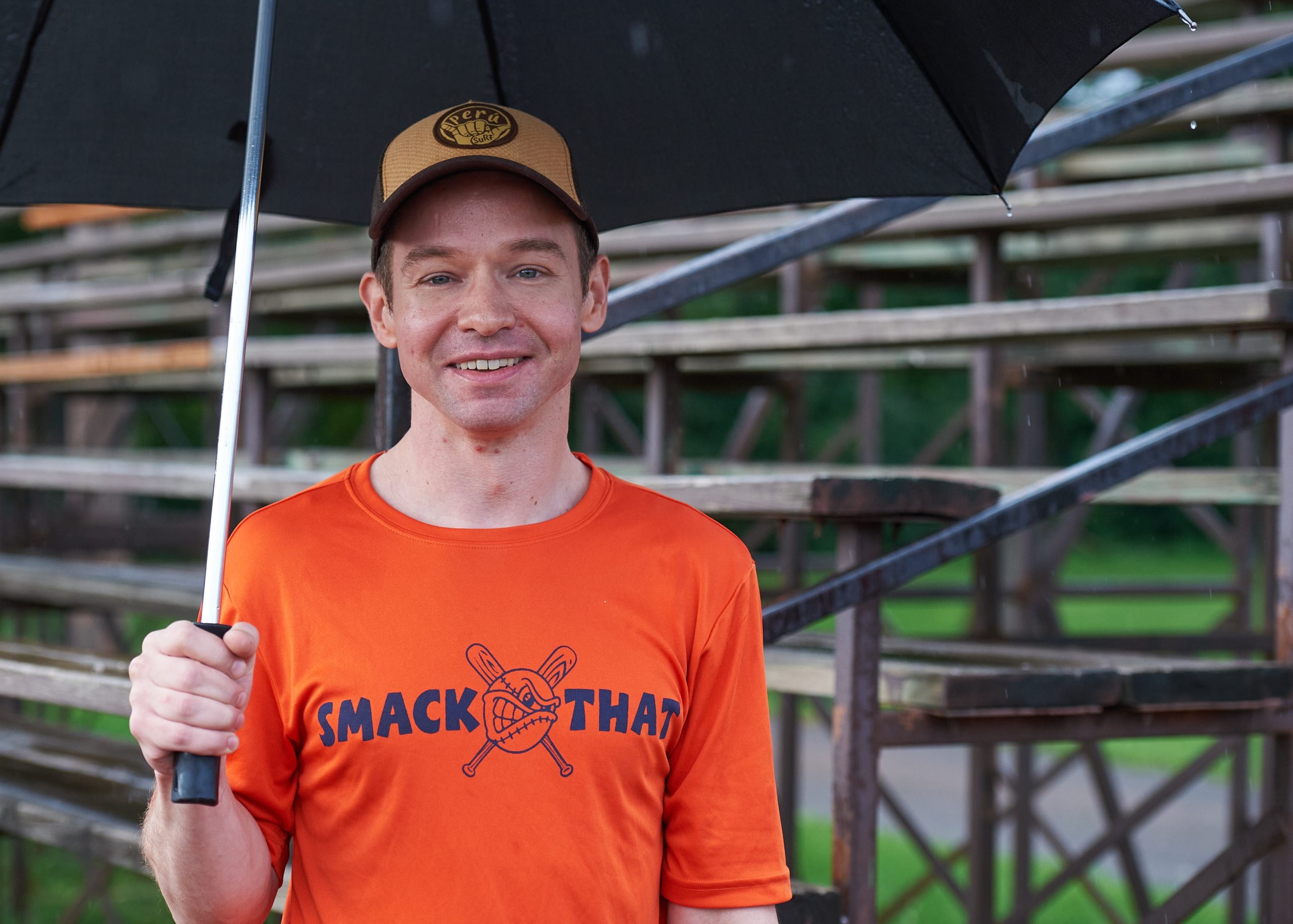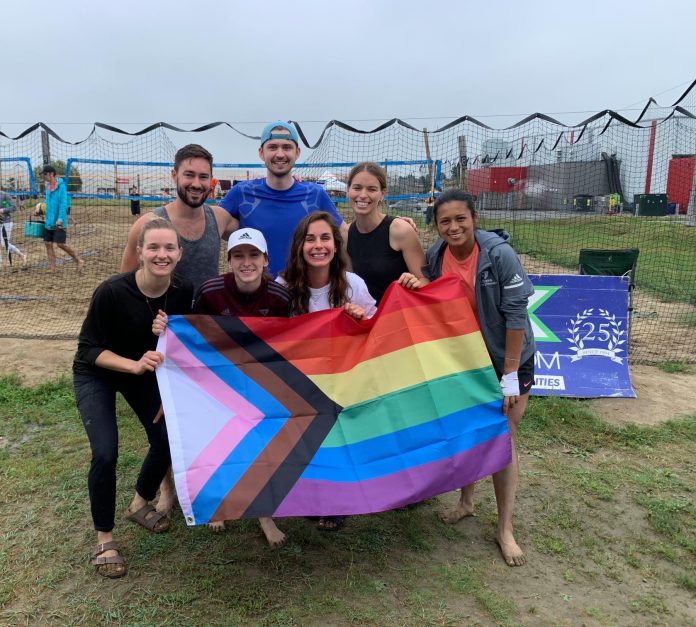By Bradley Turcotte
When Mechanicsville resident Corey Pinder moved to Ottawa during the pandemic, he was looking for a way to meet new people in the era of social distancing.
Having played with LGBTQ2S+ softball and curling leagues in Vancouver, Pinder signed up for an Ottawa Queer Softball Leagues (OQSL) drop-in game during the summer of 2021.
“You could see how excited everyone was to be back playing ball,” Pinder said. “It was a great and welcoming atmosphere. I ended up playing most Fridays that summer. Here we are a couple of years later and I’m still playing with OQSL.”
For members of Ottawa’s LGBTQ2S+ community looking to get active and form new connections, there is a healthy roster of leagues in the city, no matter your skill level or which season it may be.
The history of Ottawa’s queer sports leagues traces its origins to 1986 with Club Moustache. Beginning as a “gay men’s sporting club” that did everything from badminton to self-defence classes, the name of the organization was changed to Time Out as “women were not too keen on joining” due to the group’s macho name, said former Time Out Hiking coordinator Glenn Bugg.
Kevin Nixon remembers Club Moustache, as he is a founding member of Gay Ottawa Volleyball (GOV), Rainbow Rockers (RR) curling, and OQSL.
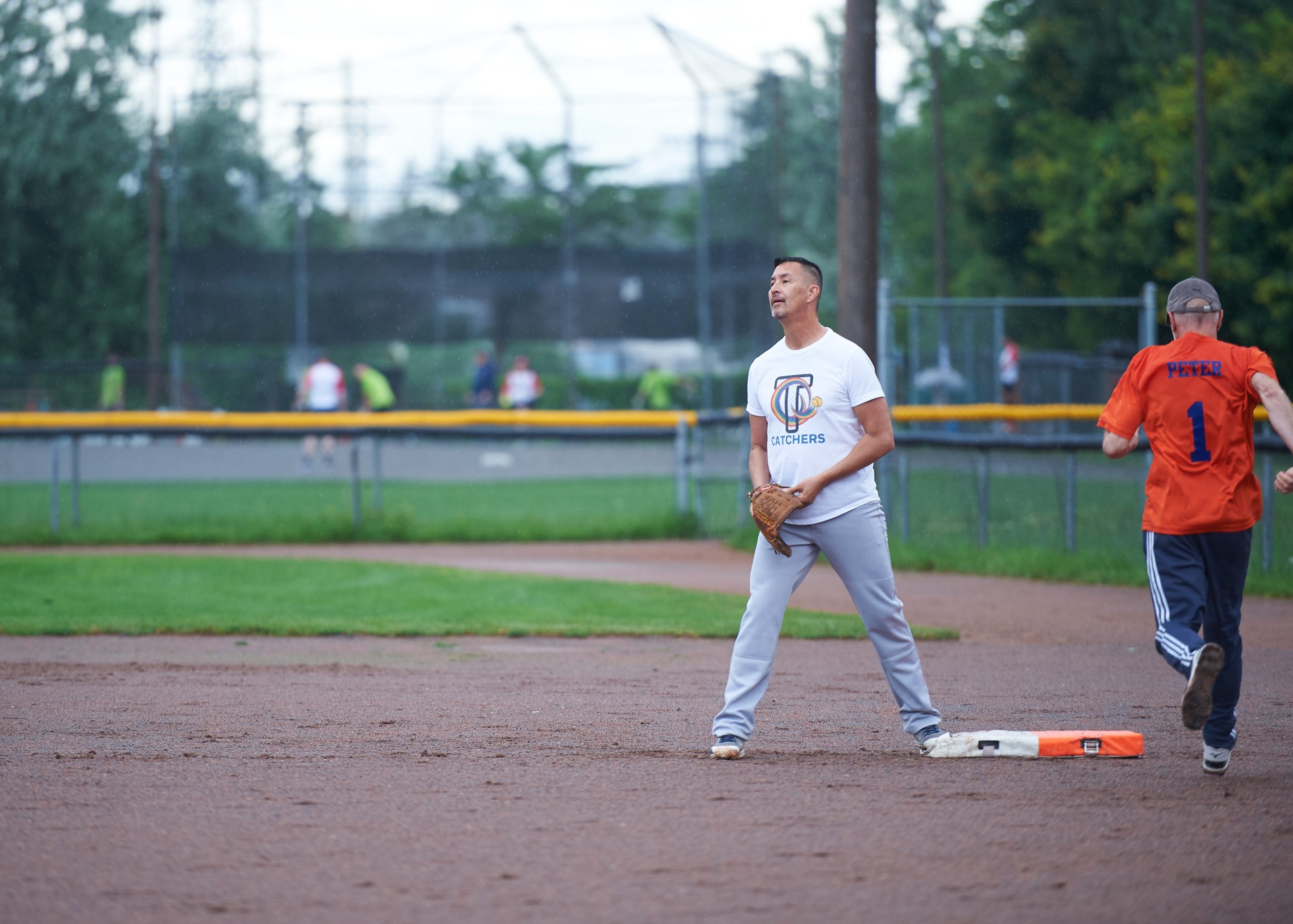
The softball league unofficially started in 2000 when Nixon and his friends, Donald Walker and Marshall Rowat, teamed up to play in a Montreal tournament. OQSL, originally named Ottawa Q Ball, officially rented fields as a league in 2008.
When Nixon moved to Ottawa in 1992, “we didn’t have Grindr and swipe left or swipe right. You either went to bars or became a joiner. In this age of being online, it can be quite lonely. This is a real connection with people.”
There aren’t many of “the originals” playing this year, Nixon laughed, adding he is happy to see how far OQSL has progressed, with 13 teams this year having names like Basic Pitches and Saaasy Slaaayers that keep the spirit of “everyone can play.”
When OQSL commissioner and Smack That captain Chantelle Northwood joined the league in 2009, there were four females on the field. This year 40 percent of players are female.
“It is the most welcoming league. We have players who can play in any other league and players who can’t throw a sock across the bedroom,” Northwood said. “Part of our league is that everybody hasn’t had a chance to play organized sports. You are part of the community. Everybody hasn’t had the opportunity to have that.”
A pitcher on his elementary school baseball team, Tristan Dang throws strikes for Dingbats this year. It is Dang’s eighth season with OQSL.
“I don’t believe everyone that’s part of the OQSL community knows that I’m trans,” Dang said. “When I first started with the league, I was at the beginning of my journey with discovering myself as Tristan. Finding OQSL has been a gift that has enriched my life. Not only have I made friends, but I’ve also come across my chosen family. I always do my best in welcoming folks to the league as I recall what it was like to step out of my comfort zone.”
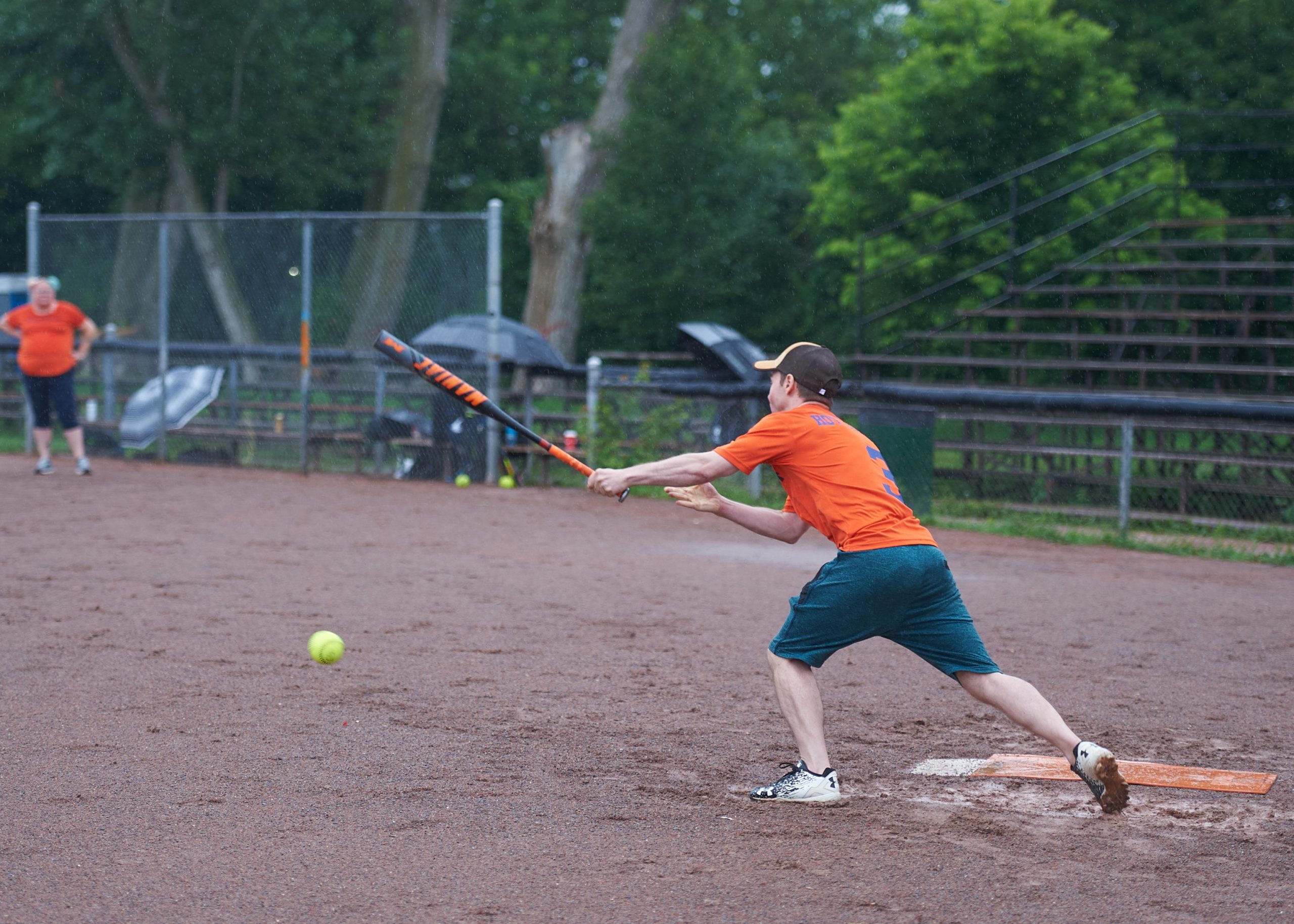
Dang said his favourite memories of OQSL include marching in the Capital Pride parade and “dressing up and playing ball for a good cause by raising money for Bruce House at Drag and Balls.”
OQSL’s annual Drag and Balls event has become “one of the destination events during Pride week,” Northwood said, raising “10-15K” each year for Bruce House, an organization serving people living with HIV who may be dealing with addiction, mental health issues, homelessness, and incarceration.
Dang encourages anyone thinking about joining OQSL next year to take a seat in the dugout.
“Even if you don’t have a buddy to join with, I signed up on my own when I first started and I’ve never regretted taking that step,” Dang said.
When Colin Ellis first stepped onto a Gay Ottawa Volleyball court in 2017, he was admittedly nervous.
“That faded away immediately and I was hooked. It’s a very wonderful environment that is welcoming and open to newcomers,” Ellis said.
GOV has “explosively taken off” since Nixon played “informal” volleyball in 1992, he said, adding the level of play in the A division is now “varsity” — attracting players of all identities.
At a recent retreat, GOV went over a new five year plan, focusing on “diversity and inclusion.”
While there are black, indigenous, people of colour (BIPOC), women, trans, and non-binary GOV players, as well as those younger and older, GOV president David Muddiman said the not-for-profit is examining how to increase representation.
“These are specific communities with specific needs. We want to be thinking about how we can be more mindful to include those groups that often have less representation in the volleyball community” and the LGBTQ2S+ community, Muddiman said.
Offering indoor matches and summer beach volleyball, GOV operates year round with league and drop in nights.
“We want to make sure we create an environment that is welcoming of everyone who wants to come and play,” Muddiman said of drop-in nights. “Especially those people who are new to the sport.”
For any prospective GOV player, the Saturday Showdown event acts as an introduction to spikes and serves. A new player is assigned a team and is mentored for the day.
“This is meant to be more social and friendly,” Muddiman said. “Having some fun, sharing some laughs, and playing some volleyball. Then having access to coaching and guidance.”
Many LGBTQ2S+ adults who play recreational sports were discouraged from participating as kids due to bullying and heteronormativity, Muddiman said.
“They have come to GOV as an adult to give sports another try. That they have been able to access sport really hits close to home,” he said. “Sport can be such a life affirming, community affirming experience.”
Ellis echoes Muddiman’s sentiment, adding that creating a queer friend group that is not sexualized or centred around alcohol improves mental health.
“Sports have traditionally been kept away from queer people,” Ellis said. “Having a space where you can take that back is very powerful and meaningful.”
The teams of Ottawa Pride Hockey (OPH) may occasionally lack power, but co-founder Kat Ferguson shoots that away.
“We don’t care. We are having a good time,” Ferguson laughed.
With two teams playing against primarily men in the Carleton Adult Hockey League, OPH is mostly players who were assigned female at birth, but the league also welcomes gay men and straight allies, Ferguson said.
Inspired by a trip to Boston to play with Team Trans, Ferguson noticed “the atmosphere and the feeling of safeness in the change room.”
Ferguson and the team started with pickup games in 2020. OPH continues to offer drop-in pickup games year round and provides equipment for new players.
OPH strives to be a league where you are “able to be your whole self,” Ferguson said.
“A lot of people that are playing with us quit hockey when they decided to transition or a lot of them felt like hockey was not a safe space. They never played and they’re coming to this as an adult,” Ferguson, who has sledge hockey coaching experience and has laced up for 40 years, said. “We are getting a lot of people coming back to the sport and a lot of new people.”
On a different sheet of ice, Rainbow Rockers Curling have been sliding along for over 20 years.
Beginning with 32 players, the league now has around 30 teams and sweeps several days a week during their season.
Curling can get competitive, Nixon laughed, despite its less physical nature.
“There is a lot of crossover from OQSL,” Pinder said of RR. “It’s a reason to get out of the house during the winter, be social, meet some new friends, and have a drink after.”
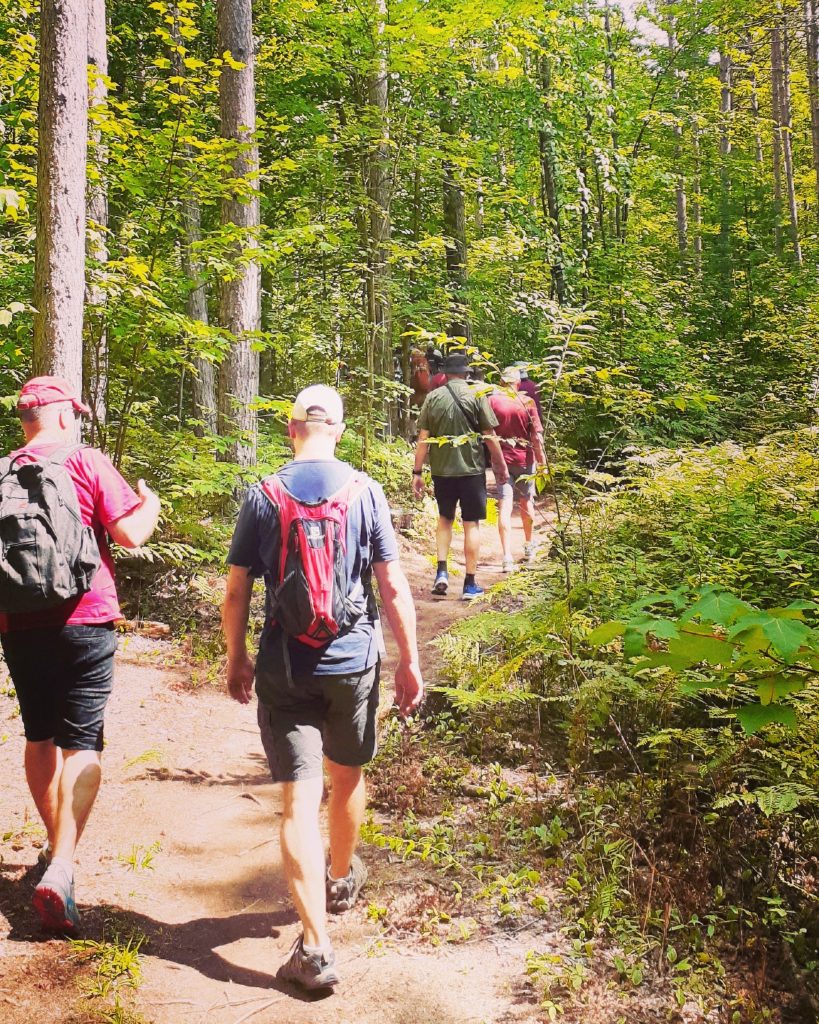
If these sports aren’t your speed, the original gay activity group, Time Out, welcomes you to frolic through the forest.
“With many sports, people may be reluctant to join because they’ve never played before or they’re not very good at it. But hiking, you’re just walking,” Bugg said. The group primarily sticks to Eastern Ontario and Western Quebec, but has gone as far as Frontenac Park, Calabogie, and Pontiac, Bugg explained.
An annual trip to the Adirondacks was cancelled when a former American President enacted a ban on Muslim travellers, and Time Out refused to exclude members. Although a low impact activity, Bugg remembers a severe hand gash and one hiker who broke his ankle in New York State.
“He basically had to be carried hobbling down the mountain,” Bugg recalled.
Time Out may be limping along this year as attendance is down after an increased demand for hiking in 2021. Bugg describes the group as in a state of “flux” as they search for a new permanent coordinator.
“There are over 700 people in the Facebook group but at any given event there’s rarely more than ten,” Bugg said. “There’s a whole bunch of people that never come out.”
Bugg calls for potential hikers to join Time Out on the path.
“It doesn’t require special equipment or special skills and knowledge. If you can walk, you can hike,” Bugg said.
The progression of Ottawa’s LGBTQ2S+ sports leagues parallel the growth of the queer community, Nixon observed.
“Gay villages used to be a place where we went to be safe. Now they are much more welcoming,” Nixon said. “The development of the leagues mirrors the progress of our community.”
